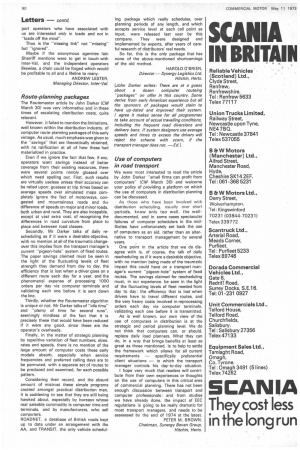Route-planning packages
Page 92

If you've noticed an error in this article please click here to report it so we can fix it.
The Routemaster article by John Darker (CM March 30) was very informative and in these times of escalating distribution costs, quite relevant.
However, it failed to mention the limitations, well known within the distribution industry, of computer route-planning packages of this early vintage. As usual, much emphasis was given to the -savings" that are theoretically obtained, with no ratification at all of how these had materialized in practice.
Even if we ignore the fact that few, if any, operators want savings instead of better coverage from their existing resources, there were several points nimbly glossed over which need spelling out. First, such results are virtually useless unless their accuracy can be relied upon: guesses at trip times based on average speeds over simulated maps completely ignore the fact of motorways, congested and mountainous roads and the difference of speeds on major and minor roads, both urban and rural. They are also incapable, except at vast extra cost, of recognizing the differences in road curvature from place to place and between road classes.
Secondly. Mr Darker talks of daily rescheduling as if it were a desirable objective, with no mention at all of the traumatic changeover this implies from the transport manager's current "pigeon-hole" system of fixed routes. The paper savings claimed must be seen in the light of the fluctuating levels of fleet strength they demand from day to day, the efficiency that is lost when a driver goes on a different route each day for a year. and the phenomenal expense of processing 1000 orders per day via computer terminals and validating each one before it is sent down the line.
Thirdly, whether the Routemaster algorithm is unique or not. Mr Darker talks of "idle time" and "plenty of time for second runs", seemingly mindless of the fact that it is precisely these that would have been reduced if it were any good, since these are the operator's overheads.
Finally, in the matter of strategic planning by repetitive variation of fleet numbers, sizes, rates and speeds, there is no mention of the large amount of computer costs these early models absorb, especially when service frequencies and preferred calling days are to be permuted, with a separate set of routes to be produced and examined, for each possible pattern.
Considering their record, and the absurd amount of mistrust these simple programs created amongst practical distribution men, it is saddening to see that they are still being hawked about, especially by bureaux whose real saleable commodity is computer time and terminals, and by manufacturers, who sell computers.
ROADNET, a database of British roads kept up to date under an arrangement with the AA. and TRANSIT. the only vehicle schedul ing package which really schedules, over planning periods of any length, and which accepts service level at each call point as input, were released last year by this company. They were designed and implemented by experts, after years of careful research of distributors' real needs.
So far, this is the only package that has none of the above-mentioned shortcomings of the old method.
HAROLD O'BRIEN, Director Synergy Logistics Ltd, Hit chin, Herts.
iJohn Darker writes; There are at a guess about a dozen computer routeing "packages" on offer in this country. Some derive from early American experience but the sponsors of packages would claim to have up-dated and improved their system. I agree it makes sense for all programmes to take account of actual travelling conditions, including the frequent road diversions and delivery bans If system designers use average speeds and times to excess the drivers will reject the scheme with scorn, if the transport manager does not. — Ed. I



























































































































































































































